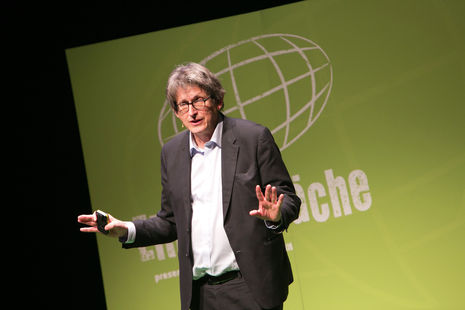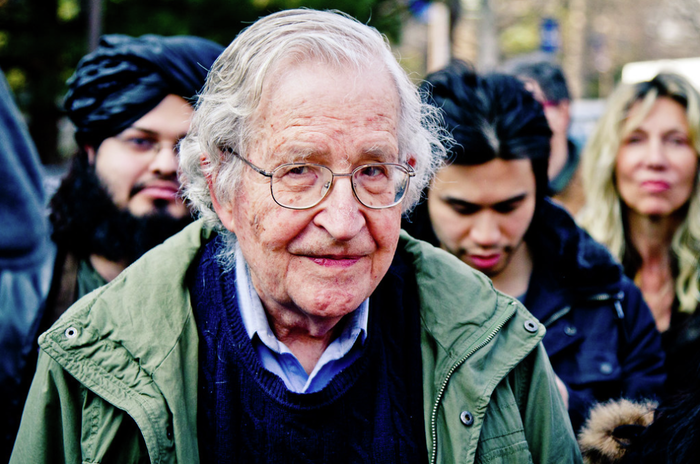Alan Rusbridger discusses ‘criminality in the British press’ at the virtual Union
The former Guardian editor offered a reflection on media ethics, recent developments in journalism and his time in the industry

Alan Rusbridger, former editor of The Guardian and Principal of Lady Margaret Hall, Oxford, appeared at the Union via Zoom on Monday afternoon (11/05).
In his interview with Speakers Officer Josh Kimblin, Rusbridger spoke about the changes he had seen in the journalism industry over his years of involvement.
He stated that when The Guardian first investigated the News International phone-hacking scandal it was still a closed community, with a tendency to “close wagons and not welcome coverage” in order to protect each other’s interests. The Guardian’s investigation was as such “sort of unheard of for dog to eat dog in a way that we did.”
When asked if there had been a culture change post-Leveson, Rusbridger said that he thought “it was better than it was.” The Press Complaints Commission (PCC) was a “toothless regulator” whilst “whatever the faults” of it’s successor, the Independent Press Standards Organisation (Ipso), it still represented a “better position than what we were before Leveson.”
He furthered that he can’t envisage that “the level of criminality that was going on in the British press before Leveson is going on now — it would be crazy if that was going on inside newsrooms today.”
When asked about his most difficult decision as editor, he pointed to The Guardian's decision to release the ‘Snowden emails’ which detailed mass surveillance of citizens by governmental intelligence agencies. He stated that the release engaged the most “difficult and varied dimensions” of any decision making process, and being in a position “to decide on the legal, editorial, moral, technological and ethical” issues was “really difficult.”
In a follow-up question, Rusbridger was asked how ethical considerations around the release of classified information had changed in the aftermath of the Democratic National Congress’s hacked emails, by Julian Assange’s Wikileaks, an incident deemed by the CIA to have been associated with Russian efforts to sabotage Hillary Clinton’s 2016 election campaign.
He replied “if you believe in a free press, it must be free”, and as a consequence editors must be “free to publish what they choose”, although they should “think very hard about what this is and it’s consequences”. Admitting that he and “Julian fell out”, he still implored journalists to “express a high degree of solidarity with him”, as the things he’s been accused of are “by and large” things journalists do “all the time.”
By “washing one’s hands” of him and questioning his status as a journalist, other journalists are “storing up trouble” for editors who “resent the state behaving” in a way similar to how “the Americans are currently behaving towards” Assange.
In discussing the BBC and recent questions around the licence fee funding model, Rusbridger stated that despite feeling “frustrated” at the BBC’s “size and it’s deep pockets” compared to the often financially precarious Guardian and believing that the license fee model is looking increasingly “outdated”, he thinks the BBC is “solidly worth having.”
“You have a role in life as a citizen as well as an editor”, and the “country would be no better off” without the “tent peg in the ground that is the BBC”. The public service broadcaster model of the BBC, ITV and Channel Four, represented public value, and these broadcasters should be handled with “great care”, he said, especially in the face of “the wilder dreams of Dominic Cummings of maybe destroying the BBC.”
On the subject of news as entertainment, he lamented the conversion of many media outlets under financial pressure into those providing “churnalism”, where volume is prioritised over quality of information.
Rusbridger also singled out the “polemical” press outlets of The Telegraph, The Sun, The Daily Mail, and The Daily Express for their reporting on Brexit and the coronavirus. This is a “terrible defamation of what newspapers should be doing.” Media, he opined, must be “broadly neutral”, as the “traditional function of news is to inform you about both sides of the argument, so that you as citizens can make your minds up.”
When asked by Kimblin if the press had started to become a “mouthpiece” for a government that’s “increasingly using the media to settle internal disputes”, he expressed concern about the use of “off the record” and “backroom” anonymous information releases by the Prime Minister’s Chief Adviser Dominic Cummings.
He stated that these were easy to deny, and “seeped trust” away from the press, although in this “country the press are so competitive that it’s so difficult to get [them] to unite” to stop facilitating leaks.
Turning to the recent coronavirus pandemic, Kimblin asked whether this would mark a return of trust in “experts.” Rusbridger stated that he hoped this would be the case, and expressed “astonishment” that “otherwise highly intelligent people often educated at Oxford or Cambridge” could “collude” with a movement that says “there is no such thing as truth,” which he labelled as the “upshot” of the concept of “fake news.”
Concluding, the former editor was asked what advice he would give audience members attempting to make a career in journalism. He replied that as “everything is media”, quoting American journalist Jeff Jarvis, the industry is now “much flatter”. Although “one’s chances of getting a job at the Guardian or the Times are low, everyone needs people who can write, research and interpret data”.
Aspiring journalists should create a website as an archive of what they can do, find people who want you to write about what you’re interested in, and “get to it.”
The full interview is available on the Cambridge Union YouTube channel.
 News / Clare Hall spent over £500k opposing busway 24 December 2025
News / Clare Hall spent over £500k opposing busway 24 December 2025 Comment / The ‘class’ of Cambridge24 December 2025
Comment / The ‘class’ of Cambridge24 December 2025 News / Caius mourns its tree-mendous loss23 December 2025
News / Caius mourns its tree-mendous loss23 December 2025 Comment / League tables do more harm than good26 December 2025
Comment / League tables do more harm than good26 December 2025 News / Girton JCR publishes open letter expressing solidarity with Palestine25 December 2025
News / Girton JCR publishes open letter expressing solidarity with Palestine25 December 2025









